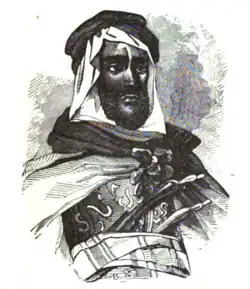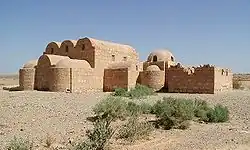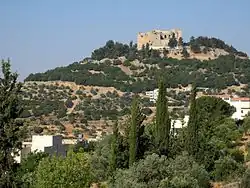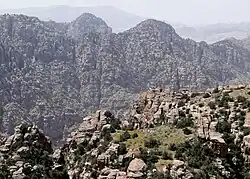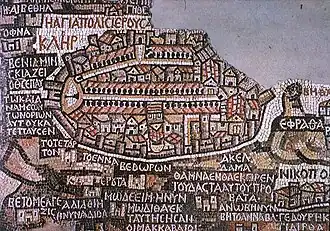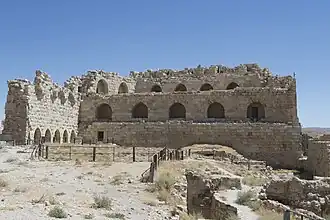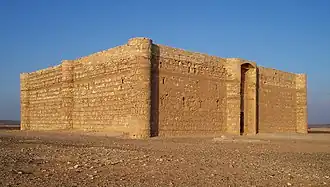Portal:Jordan
The Jordan Portal.svg.png)  Jordan, officially the Hashemite Kingdom of Jordan, is a country in the Southern Levant region of West Asia. Jordan is bordered by Syria to the north, Iraq to the east, Saudi Arabia to the south, and Israel and the occupied Palestinian territories of West Bank to the west. The Jordan River, flowing into the Dead Sea, is located along the country's western border within the Jordan Rift Valley. Jordan has a small coastline along the Red Sea in its southwest, separated by the Gulf of Aqaba from Egypt. Amman is the country's capital and largest city, as well as the most populous city in the Levant. Inhabited by humans since the Paleolithic period, three kingdoms developed in Transjordan during the Iron Age: Ammon, Moab and Edom. In the third century BC, the Arab Nabataeans established their kingdom centered in Petra. The Greco-Roman period saw the establishment of several cities in Transjordan that comprised the Decapolis. Later, after the end of Byzantine rule, the region became part of the Islamic caliphates of the Rashidun, Umayyad, Abbasid, and the Ottoman. Following the 1916 Great Arab Revolt during World War I, former Ottoman Syria was partitioned, leading to the establishment of the Emirate of Transjordan in 1921, which became a British protectorate. In 1946, the country gained independence and became officially known as the Hashemite Kingdom of Jordan. The country captured and annexed the West Bank during the 1948 Palestine war until it was occupied by Israel in 1967. Jordan renounced its claim to the territory to the Palestinians in 1988 and signed a peace treaty with Israel in 1994. Jordan is a semi-arid country, covering an area of 89,342 km2 (34,495 sq mi) with a population of 11.5 million, making it the eleventh-most populous Arab country. The dominant majority, or around 95% of the country's population, is Sunni Muslim, with the rest being mostly Arab Christian. Jordan was mostly unscathed by the violence that swept the region following the Arab Spring in 2010. From as early as 1948, Jordan has accepted refugees from multiple neighbouring countries in conflict. An estimated 2.1 million Palestinian refugees, most of whom hold Jordanian citizenship, as well as 1.4 million Syrian refugees, were residing in Jordan as of 2015. The kingdom is also a refuge for thousands of Christian Iraqis fleeing persecution. While Jordan continues to accept refugees, the large Syrian influx during the 2010s has placed substantial strain on national resources and infrastructure. The sovereign state is a constitutional monarchy, but the king holds wide executive and legislative powers. Jordan is a founding member of the Arab League and the Organisation of Islamic Cooperation. The country has a high Human Development Index, ranking 100th, and is considered a lower middle income economy. The Jordanian economy, one of the smallest economies in the region, is attractive to foreign investors based upon a skilled workforce. The country is a major tourist destination, also attracting medical tourism with its well-developed health sector. Nonetheless, a lack of natural resources, large flow of refugees, and regional turmoil have hampered economic growth. (Full article...) Selected article - The Parliament of Jordan (Arabic: مجلس الأمة Majlis Al-Umma) is the bicameral Jordanian national assembly. Established by the 1952 Constitution, the legislature consists of two houses: the Senate (Arabic: مجلس الأعيان Majlis Al-Aayan) and the House of Representatives (Arabic: مجلس النواب Majlis Al-Nuwaab). The Senate has 69 members, all of whom are directly appointed by the king, while the House of Representatives has 138 elected members, with nine seats reserved for Christians, three are for Chechen and Circassian minorities, and fifteen for women. The members of both houses serve for four-year terms. (Full article...) Selected biography -The Hashemites (Arabic: الهاشميون, romanized: al-Hāshimiyyūn), also House of Hashim, are the royal family of Jordan, which they have ruled since 1921, and were the royal family of the kingdoms of Hejaz (1916–1925), Syria (1920), and Iraq (1921–1958). The family had ruled the city of Mecca continuously from the 10th century, frequently as vassals of outside powers, and ruled the thrones of the Hejaz, Syria, Iraq, and Jordan following their World War I alliance with the British Empire. The family belongs to the Dhawu Awn, one of the branches of the Ḥasanid Sharifs of Mecca, also referred to as Hashemites. Their eponymous ancestor is traditionally considered to be Hashim ibn Abd Manaf, great-grandfather of the Islamic prophet Muhammad. Another claimed ancestor is Ali ibn Abi Talib, the usurped successor of the prophet Muhammad according to Shia Islam. The Ḥasanid Sharifs of Mecca (from whom the Hashemite royal family is directly descended), including the Hashemites' ancestor Qatadah ibn Idris, were Zaydī Shīʿas until the late Mamluk or early Ottoman period, when they became followers of the Shāfiʿī school of Sunnī Islam. (Full article...) WikiProjectFor editor resources and to collaborate with other editors on improving Wikipedia's Jordan-related articles, see WikiProject Jordan. General images -The following are images from various Jordan-related articles on Wikipedia.
Selected city - Der Abi Saeed (Arabic: دير أبي سعيد) is a city in Irbid Governorate in Jordan. It is named after a historic Christian chapel ('Der' in Arabic) in the place where the city is built. The city gained importance in the early 20th century after the formation of a self-governing body following the fall of the Ottoman Empire. Der Abi Saeed is the administrative center of the Koura Department, one of the nine departments of Irbid Governorate. (Full article...)
See also: List of cities in Jordan
Related portalsReligions in Jordan Arab states Other countries Recognized content
Featured articlesGood articles
TopicsSelected topic overview -
CategoriesSelect [►] to view subcategories
Jordan Jordan-related lists Buildings and structures in Jordan Culture of Jordan Economy of Jordan Education in Jordan Environment of Jordan Geography of Jordan Government of Jordan Health in Jordan History of Jordan Organisations based in Jordan Jordanian people Politics of Jordan Society of Jordan Jordan stubs Selected picture - Credit: Mahmood Salam Amman, the capital of Jordan at nighttime. Amman was named one of the MENA's best cities according to economic, labour, environmental, and socio-cultural factors. It is a major tourist destination in the region and the capital is especially popular among Gulf tourists. Amman is considered one of the richest and most Western-oriented cities in the Middle East.
Associated WikimediaThe following Wikimedia Foundation sister projects provide more on this subject:
SourcesDiscover Wikipedia using portals
|
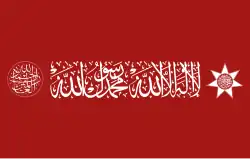



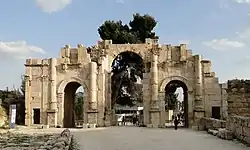

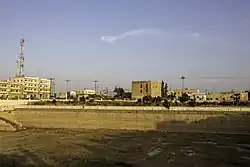
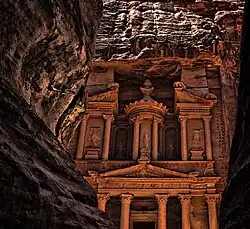
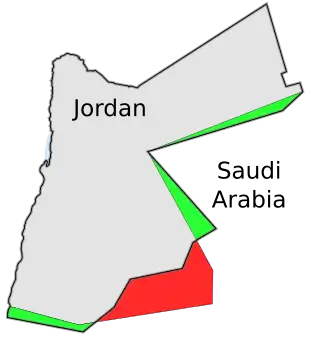


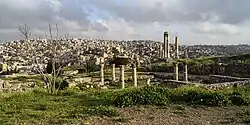

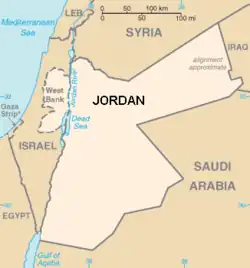

_(cropped).jpg)

_-_Sheik_of_Adwan_outside_his_tent_at_Shunet_Nimrin_LOC_matpc.19018.jpg)
